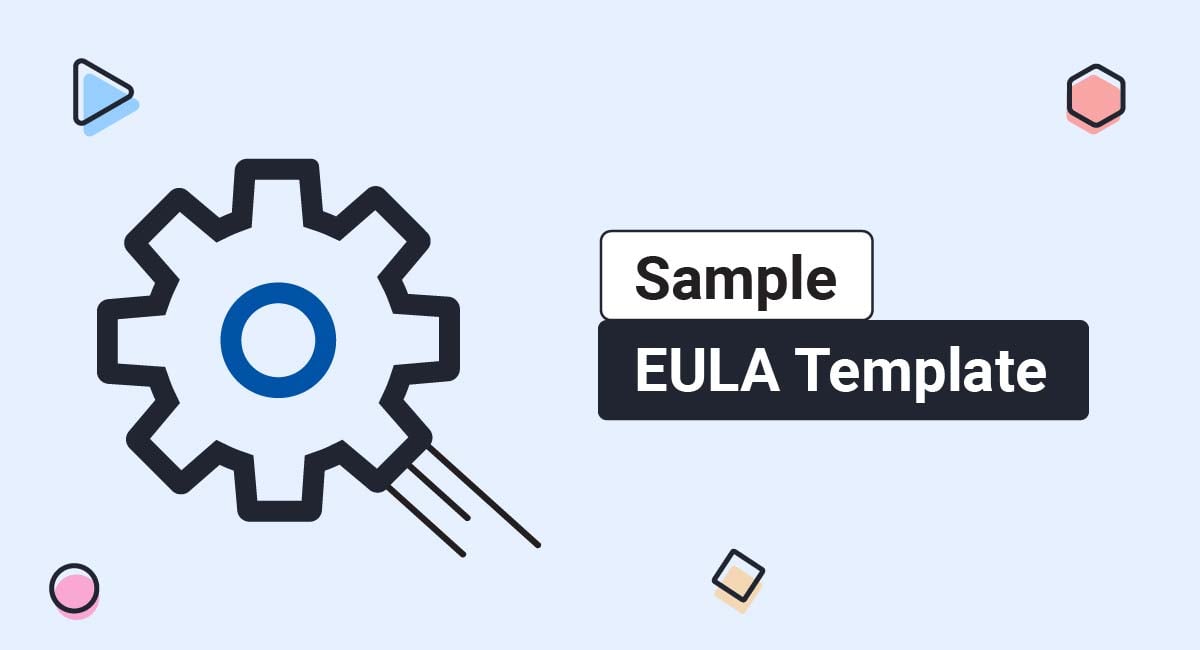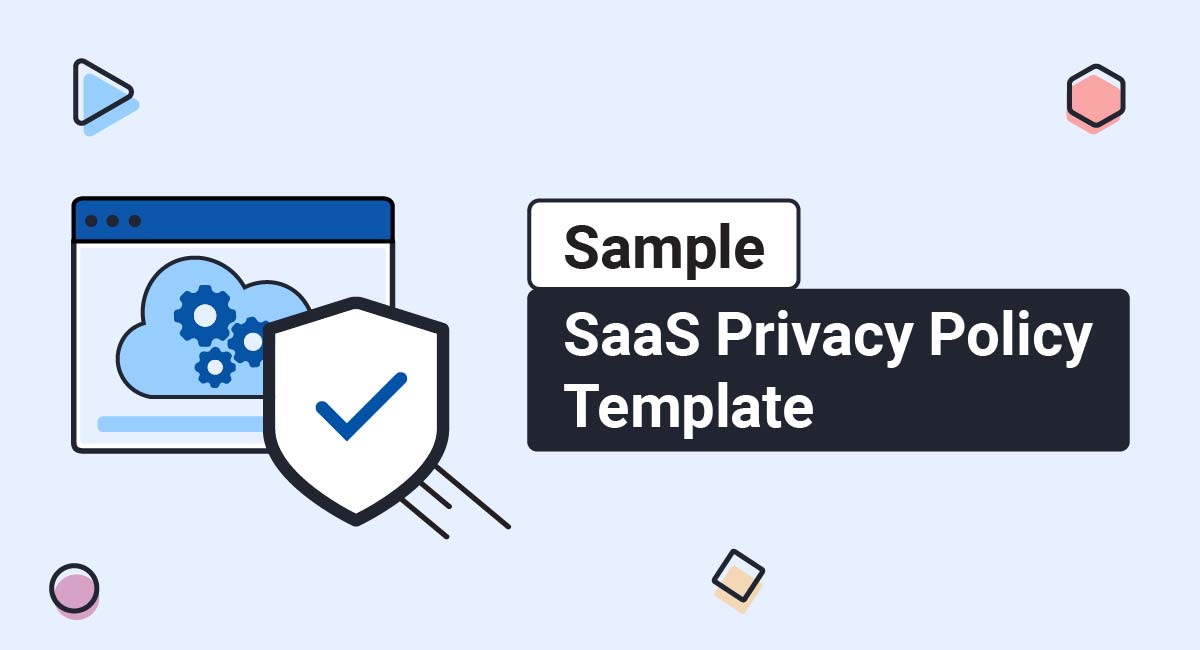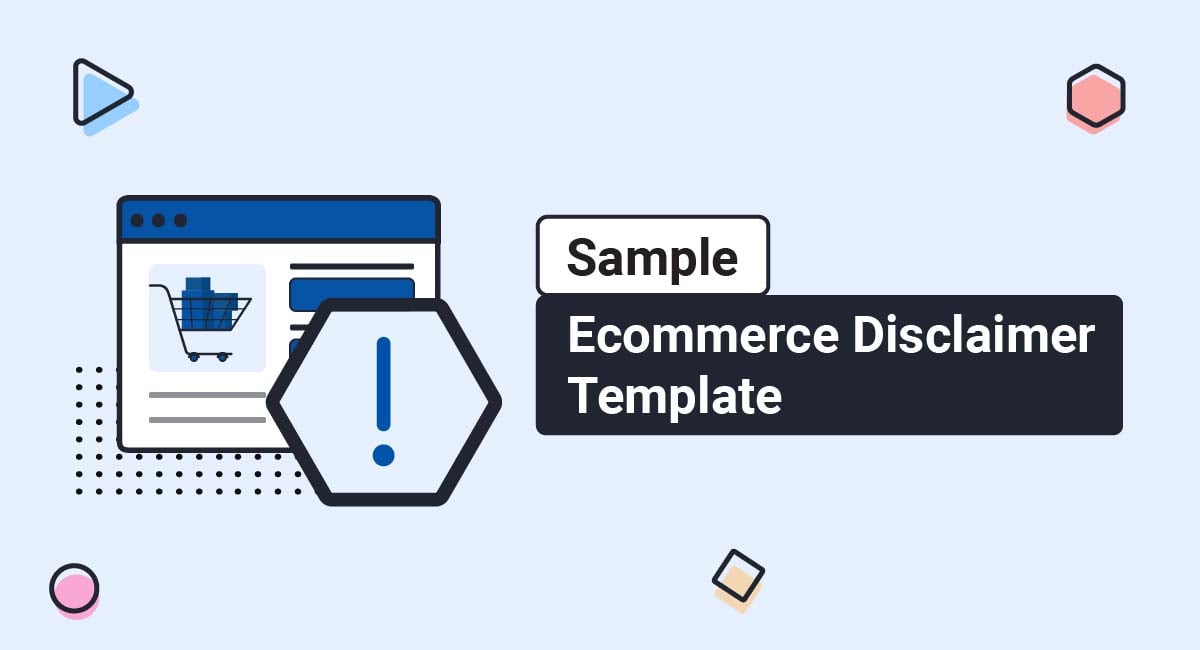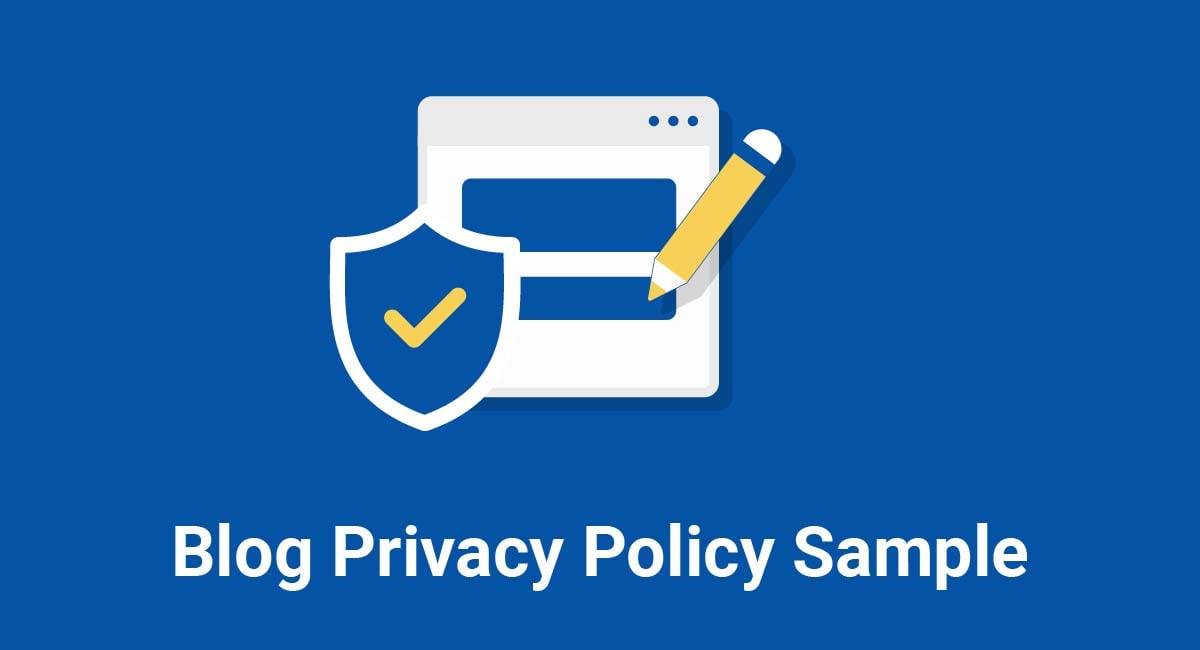An End-User License Agreement (EULA) is an agreement put in place between someone who purchases, installs, or downloads software, and the licensor or provider of that software.
This article will look at what clauses an EULA should include and help you create your own EULA.We've also put together a Sample EULA Template that you can use while writing your EULA.
Our EULA Generator makes it easy to create an EULA. Just follow these steps:
-
At Step 1, select the Desktop app option and click "Next step":
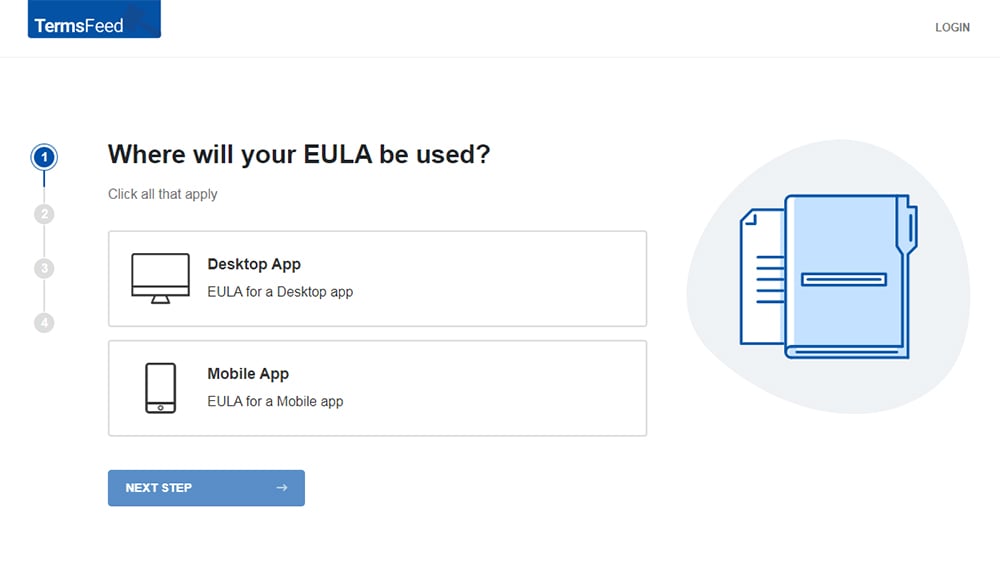
-
Answer some questions about your app.
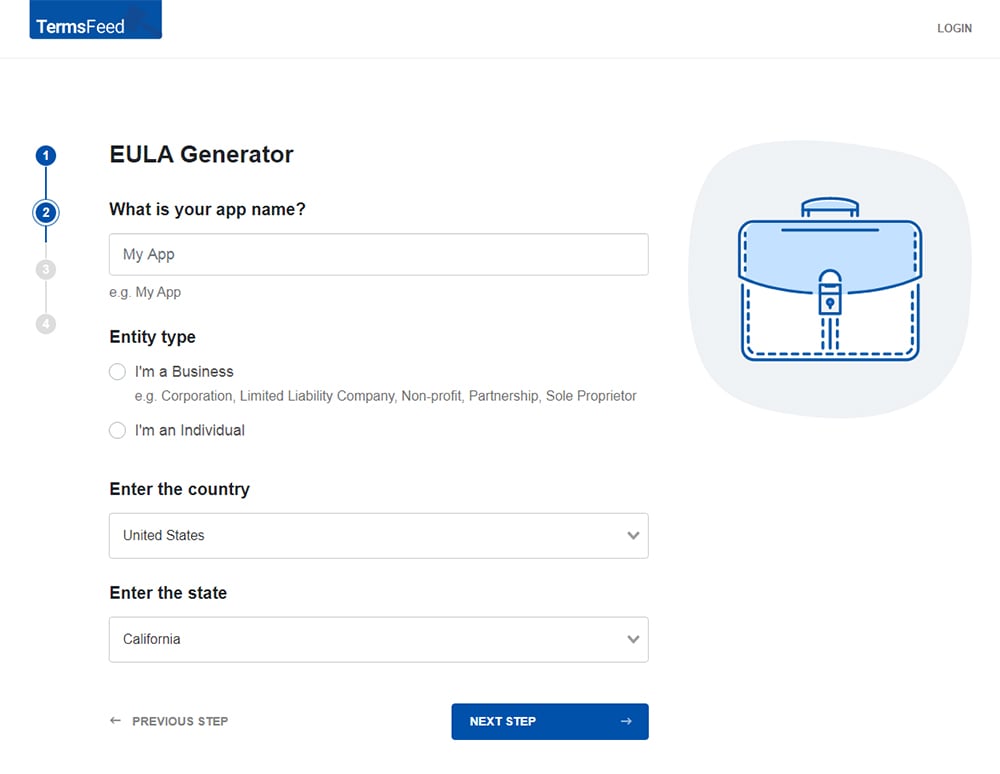
-
Answer some questions about your business.
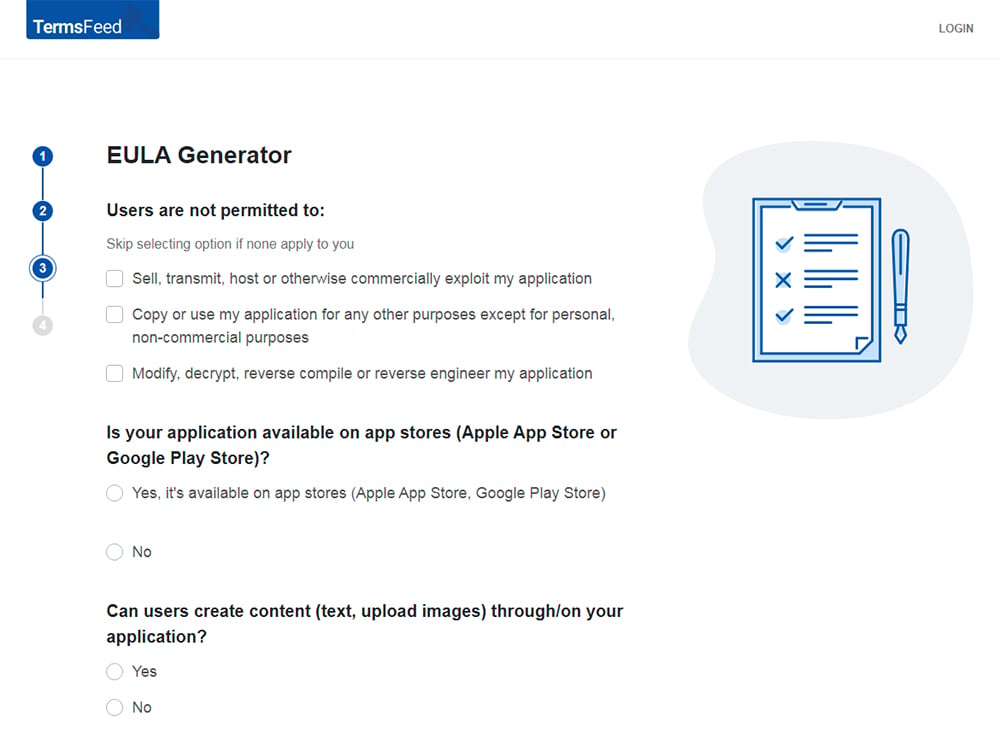
-
Enter the email address where you'd like to receive the EULA document and click "Generate."
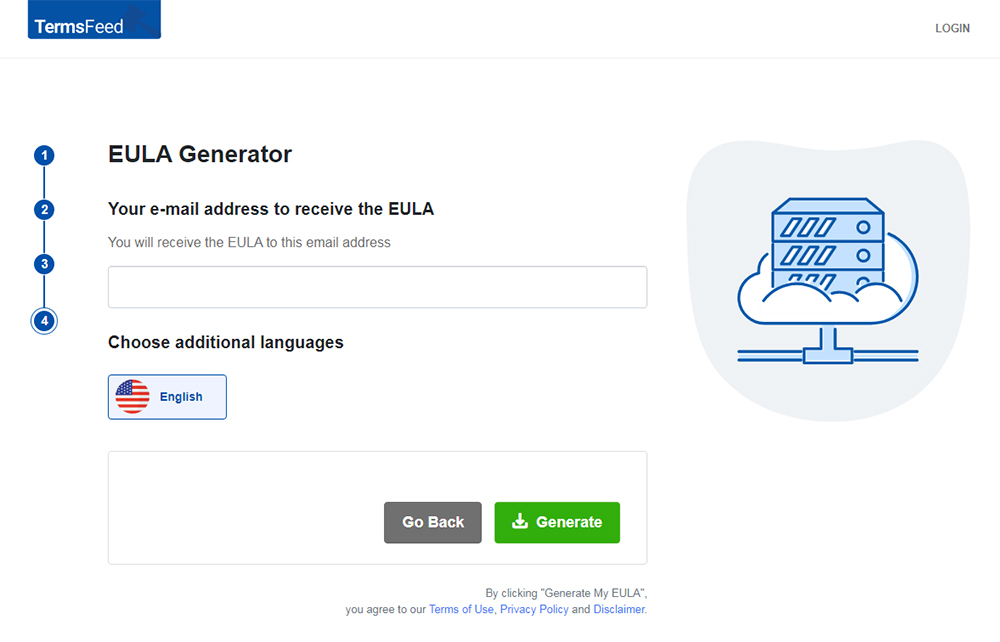
You'll be able to instantly access and download your new EULA.
- 1. What is an EULA
- 2. EULA vs. Terms and Conditions
- 3. Common Clauses for an EULA
- 3.1. License Granting
- 3.2. Restrictions on Use
- 3.3. Related Agreements
- 3.4. Copyright Infringement/Intellectual Property
- 3.5. Termination of Licensing
- 3.6. Warranty Disclaimer
- 3.7. Limitations of Liability
- 4. How to Get Users to Agree to Your EULA
- 5. FAQs Regarding EULAs
- 6. Download Sample EULA Template
- 6.1. Sample EULA Template (HTML Text Download)
- 6.2. Sample EULA Template (PDF Download)
- 6.3. Sample EULA Template (Word DOCX Download)
- 6.4. Sample EULA Template (Google Docs Download)
- 6.5. More Templates
What is an EULA
EULAs are documents that are used to define the scope of how software can be used, cannot be used, and any rights the buyer of the software application may have or not have. They're typically presented to users during the installation or set-up stage of the software for review, and must be agreed to before installation can be completed.
An EULA is important for software developers because when someone installs, downloads, or uses a copy of your software application on their computer or mobile device, they are, in essence, making a copy of the copyrighted software.
This legal agreement will dictate limits and liabilities that come along with personally using this copyrighted software.
An EULA as a legal agreement goes by different names:
- EULA
- End-User License Agreement
- License Agreement
- Software License Agreement
- Licensed Application End-User Agreement
EULA vs. Terms and Conditions

Generally speaking, a Terms and Conditions agreement (also known as Terms of Use or Terms of Service) covers more topics and is much broader in scope than an EULA.
An End-User License agreement gives users the right to use the software and only covers issues that address the licensing of the software, while a Terms and Conditions agreement will be more in depth and detailed, covering topics like payment schedules, privacy issues, third-party service providers, fees and costs, dispute resolution, requesting refunds, use of the associated website and will often even include the EULA within it.
Unlike a Privacy Policy, an EULA agreement is not required by law, but it's extremely useful to have one for your app.
Common Clauses for an EULA

There are a few clauses that should be included in every EULA.
These clauses address license granting, restrictions on use, infringement information, termination of licensing, and disclaimers and limitations of warranties and liability.
License Granting
The primary purpose of an EULA is to grant a license of use for an app to an end user. Because of this, every end-user license agreements should have a section that explicitly states that a license is being granted.
Below is an example of a clause in an EULA that covers license granting. Note how it makes it clear that the license is "revocable, non-exclusive, non-transferable, limited..." These limitations let a user know that while they are able to use the software or app, they cannot necessarily use it in whatever ways they want.

Restrictions on Use
Your EULA should have a section spelling out restrictions on the use of the license, or how a user cannot use your app.
Here's an example of what a very standard Restrictions clause looks like. You'll typically see restrictions on things such as reverse-engineering the software, copying the license onto multiple devices without authorization and using the software to break laws.
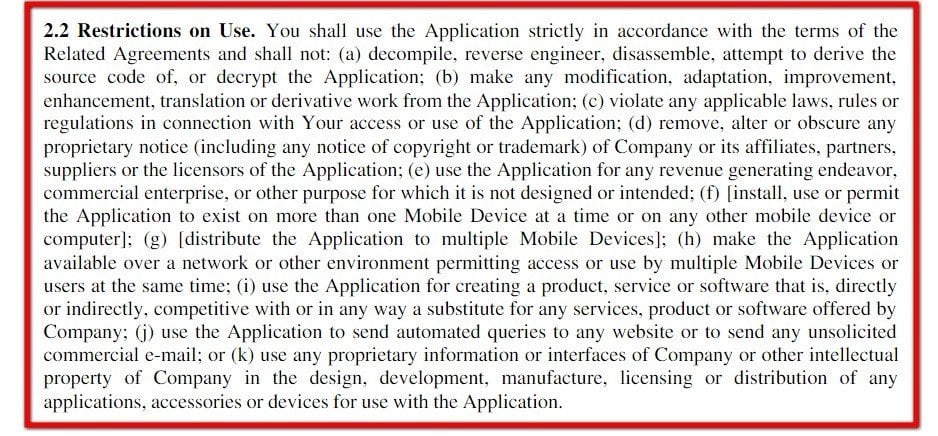
Clauses like this go on to limit competition, solicitation and protect proprietary traits of the app.
Because your software app will most likely also have copyrights and intellectual property rights, you should include a "Restriction of Use" clause similar to the one above so that you can legally limit what kind of actions others can take with or to your software application.
Instead of using one long, potentially-confusing paragraph like the one above, you can consider breaking the information down into an organized list. Your readers will appreciate it, but it isn't necessary. In fact, you'll usually see most EULAs having this type of long paragraph formatting.
Related Agreements
A clause about related agreements can give users notice that by agreeing to an EULA, the user is also agreeing to adhere to the terms of other agreements, such as a Terms and Conditions agreement or a Privacy Policy.
If you have other legal agreements that include restrictions on how your app can be used, it's a good idea to place links to all of the agreements close to your license agreement information since each legal agreement may relate to the next.
Upwork's EULA notes that both its Privacy Policy and Terms of Service are incorporated into the EULA at the bottom of the first full window you can see when viewing the EULA:
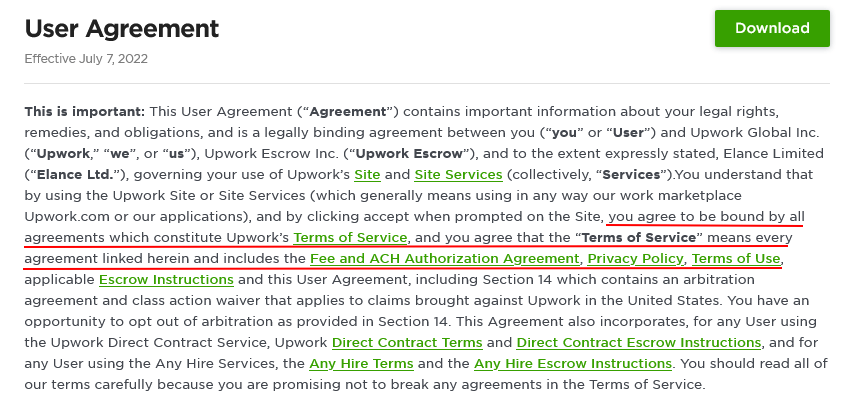
Copyright Infringement/Intellectual Property
You should always include a section in your EULA that deals with what will happen in the event of copyright infringement. Because of the nature of software programs, infringement issues are very common and important to work to avoid.
This section can be brief, such as the example below, so long as it includes broad but specific language that makes it clear that if the infringement takes place, the user will be held responsible for legal issues arising from the infringement.

Termination of Licensing
It's important for the software developer to the keep rights to terminate the license in the event of violations of use or other issues. These clauses tend to be absolute and grant very strong rights to the provider or licensor of the app rather than the end user.
For example, the clause below allows the company to "in its sole and absolute discretion, at any time and for any or no reason, suspend or terminate this License and the rights afforded..."

Warranty Disclaimer
A disclaimer of warranties is where it's made known that the app is made available "as is" and that if an end user is not happy with the software or app, the licensor or provider is not responsible for improving the software or app to satisfy the end user.
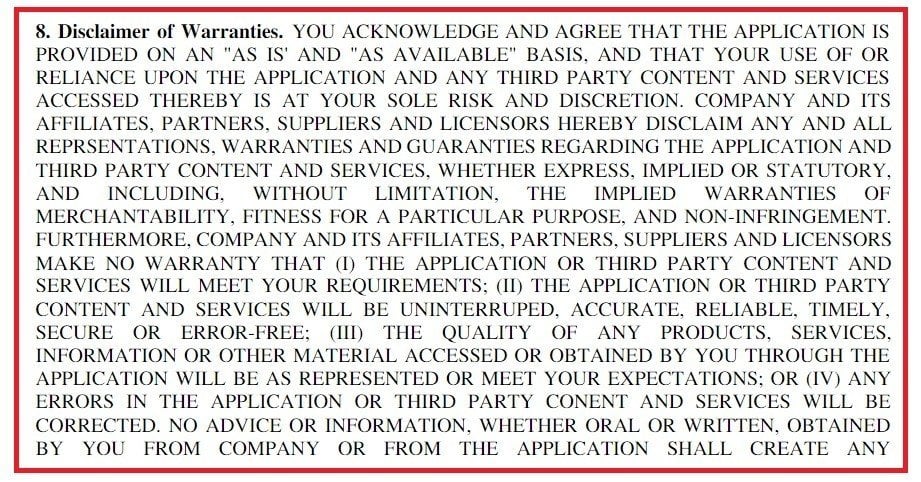
A common practice is to simply disclaim all warranties that are able to legally be disclaimed. Most of these disclaimers are very standard and almost exactly the same across the board.
Limitations of Liability
This kind of clause makes it clear that the provider or licensor will not be held responsible for any damages that arise out of the use of the app.
For example, if a user installs a mobile app and agrees to an EULA with this clause in it, then the user's phone malfunctions and breaks, the user cannot seek liability against the provider of the mobile app for reparations for the damaged phone, even if the damage was a result of the mobile app.

An effective and thorough EULA will ensure that anyone who uses your desktop or mobile app will be aware that the rights of the user only go so far and that you still maintain control over the software and who uses it.
You can protect yourself and your business by including the above clauses in an EULA and making sure your users are presented with it before installing or downloading your desktop or mobile app.
How to Get Users to Agree to Your EULA

Clickwrap is the best practice method of getting your users to agree to your EULA. Clickwrap involves making users actively click something, whether it's a checkbox or a radio button, to show they're clearly agreeing to something.
Your EULA, just like other legal agreements, is only valid if it's actually agreed to. If your users can claim they never agreed to it, you will likely have a more difficult time legally enforcing your clauses against them if you ever need to.
Here's an example of how you can have users click a radio button to show agreement:
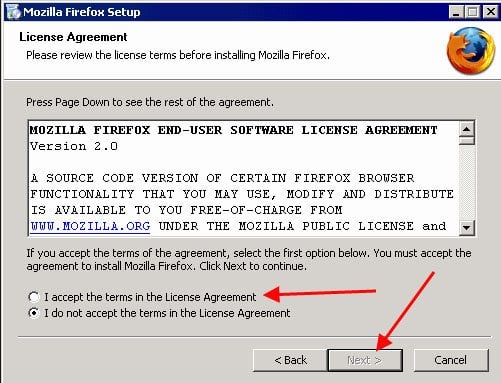
Here's another example of a checkbox in use:
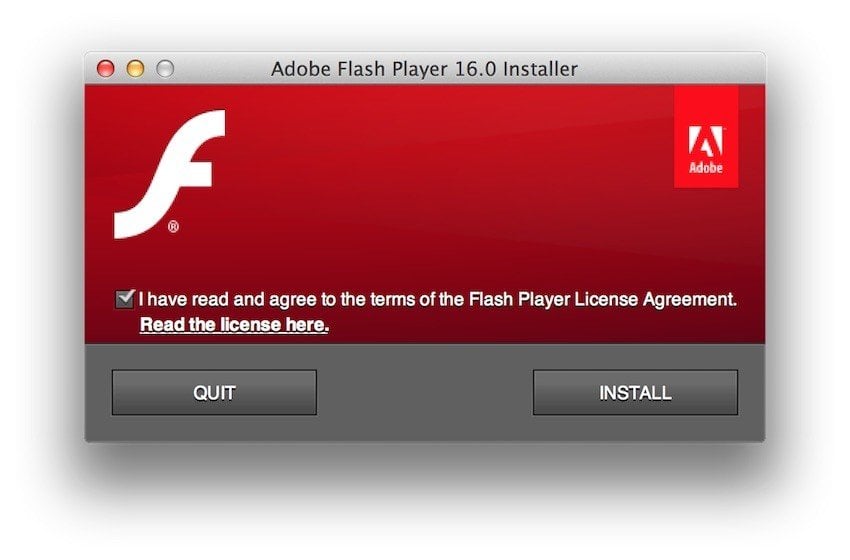
Due to the potentially-sensitive nature of sharing a license with someone without maintaining any control over what that person does with the license, it's very common to see developers requiring users to accept the EULA before being allowed to install the software. For example, in the example above, the "Install" button is actually inactive until the "I agree" checkbox has been checked. Here's how it looks before a user agrees:
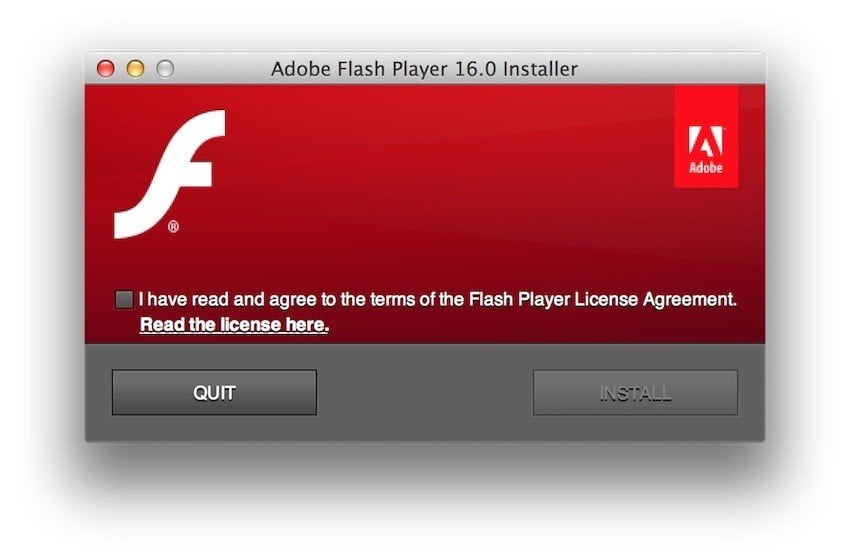
This is what the Garmin Express software does when the user installs new updates to the software. Without clicking the "I accept the agreements" checkbox and then the "Continue" button, the user can't install the pending updates:
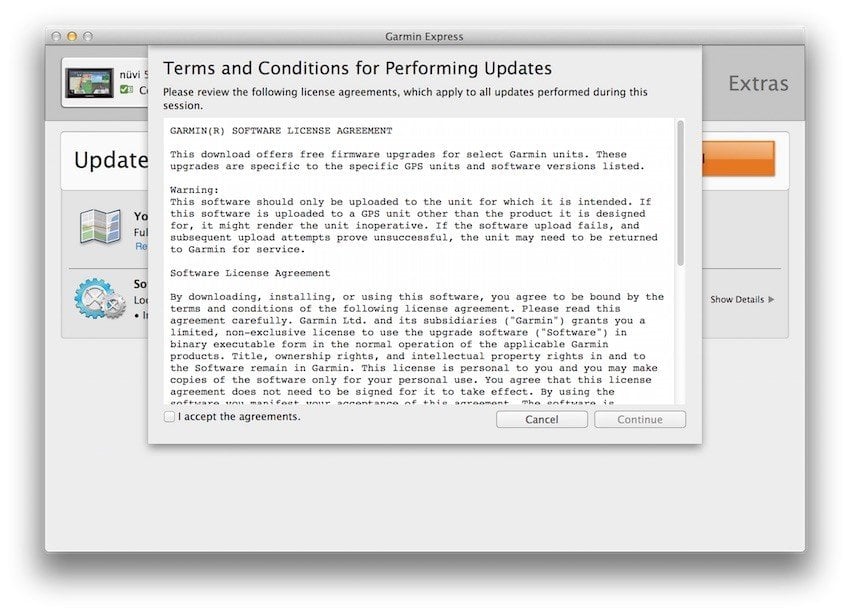
With EULAs, you can use a pop-up window when the user is starting to install the software. You can ask your users to read the agreement before being able to click "I Accept," or just ask them to click "I Accept" or "I Don't Accept" in order to continue with the software's installation (or abort the installation if they don't accept).
When users install Apple's latest version of OS X - in this case, Yosemite - they're required to click the "Agree" button to continue with the installation:
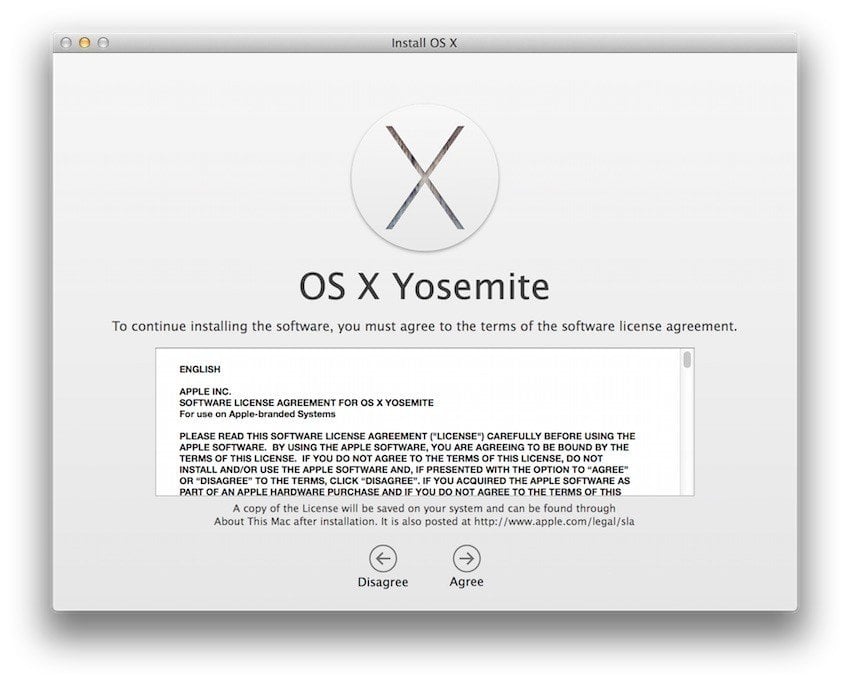
After clicking "Agree," a pop-up box appears where they must click "Agree" again:
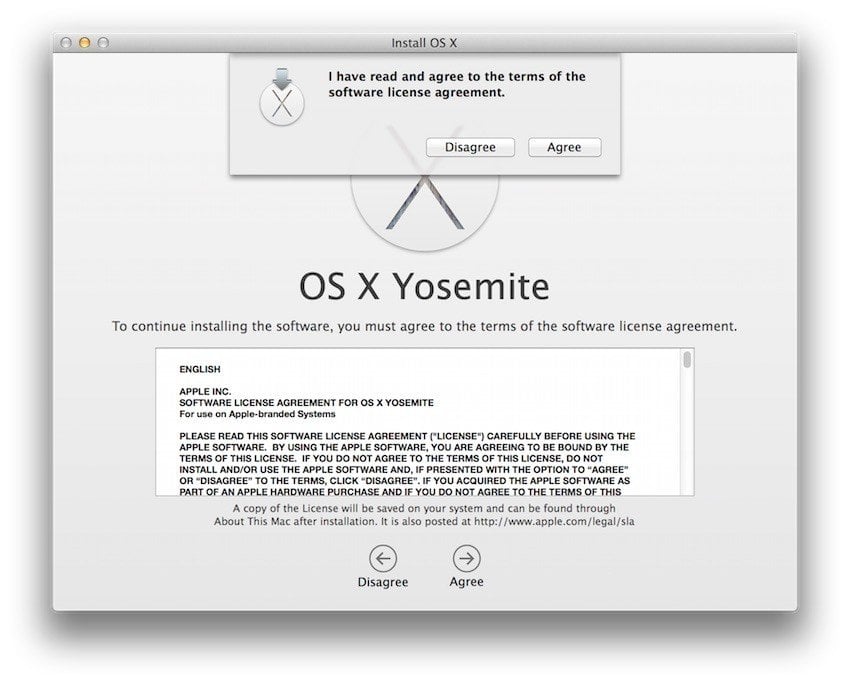
Make sure to present your EULA at the time someone is installing your software. Include clauses that help protect your rights, your proprietary and intellectual property and your users. Also include clauses that limit your liability, disclaim certain warranties and manage user expectations. Make sure you get clear agreement from each user before allowing someone to complete the install or set-up.
FAQs Regarding EULAs
Here is a list of frequently asked questions that you may find useful.
An EULA is not legally required. However, they are important agreements for software and app developers to have for a number of reasons.
Your EULA is where you explicitly grant a license to your customers, making it clear that the license is for limited use, revocable and non-transferable. It's also where you can disclaim warranties, limit your liability, outline the rules and restrictions for using the license and describe what happens if the rules are violated.
While most of this information can be included in a standard Terms and Conditions agreement, an EULA is more industry-specific for software and app developers and tends to be the preference.
Businesses that provide customers with a license to use proprietary software should consider having an EULA. This would include SaaS developers, software developers and mobile app developers.
EULA's are more standard with these types of businesses because these businesses grant limited use licenses to their customers, versus something like an ecommerce store that does not.
3. What's the difference between an End-User License Agreement and a Terms and Conditions agreement?
An EULA is more narrow in scope and deals exclusively with the terms of granting a license. Any clauses in the EULA will relate to the license itself versus other aspects of the customer-business relationship, which will be found in a Terms and Conditions agreement. You will typically only find an EULA with businesses that deal in software, SaaS or mobile apps.
A Terms and Conditions agreement is more broad in scope and will address a wider range of topics such as the use of a website, payment processing, general copyrights and user-generated content. You'll find a T&C agreement in most businesses, whether or not a license is involved.
This is up to you. Many businesses have both, with the EULA dealing exclusively with the license and the Terms and Conditions agreement dealing with everything else.
If you don't grant a license, you won't need an EULA. If you do grant a license, you can choose to have either one or both of these agreements.
If you only use an EULA, just make sure to include clauses that you would typically include in a Terms and Conditions agreement to make it more robust and all-encompassing. And if you only have a Terms and Conditions agreement, make sure to address the granting of a license within it.
The standard EULA clauses are as follows:
- Granting of the license
- Restrictions on use of the license
- Copyright infringement and intellectual property
- Termination of the license
- Warranty disclaimer
- Limitation of liability
Add a link to your EULA in your main website's footer. Users know to look here for important legal information such as an EULA.
Also add a link to the initial installation or download screen so users can access the EULA before actually accessing your software/app.
Include a link to your EULA within your software program or mobile app itself, such as in a "Settings," "Legal" or "About" menu.
EULAs are often not held to be enforceable. However, to increase the chances of yours being enforceable, have users click an unticked checkbox next to a statement that makes it very clear that by checking the box and continuing to install your software/app, they're agreeing to be bound by the terms in your EULA.
Download Sample EULA Template
Generate an EULA in just a few minutes
This Sample EULA Template includes the following sections:
- License
- Restrictions
- Modifications to Application
- Term and Termination
- Severability
- Amendments to this Agreement
- Contact Information
Sample EULA Template (HTML Text Download)
You can download the Sample EULA Template as HTML code below. Copy it from the box field below (right-click > Select All and then Copy-paste) and then paste it on your app or website pages.
Sample EULA Template (PDF Download)
Download the Sample EULA Template as PDF file
Sample EULA Template (Word DOCX Download)
Download the Sample EULA Template as a Word DOCX file
Sample EULA Template (Google Docs Download)
Download the Sample EULA Template as a Google Docs document
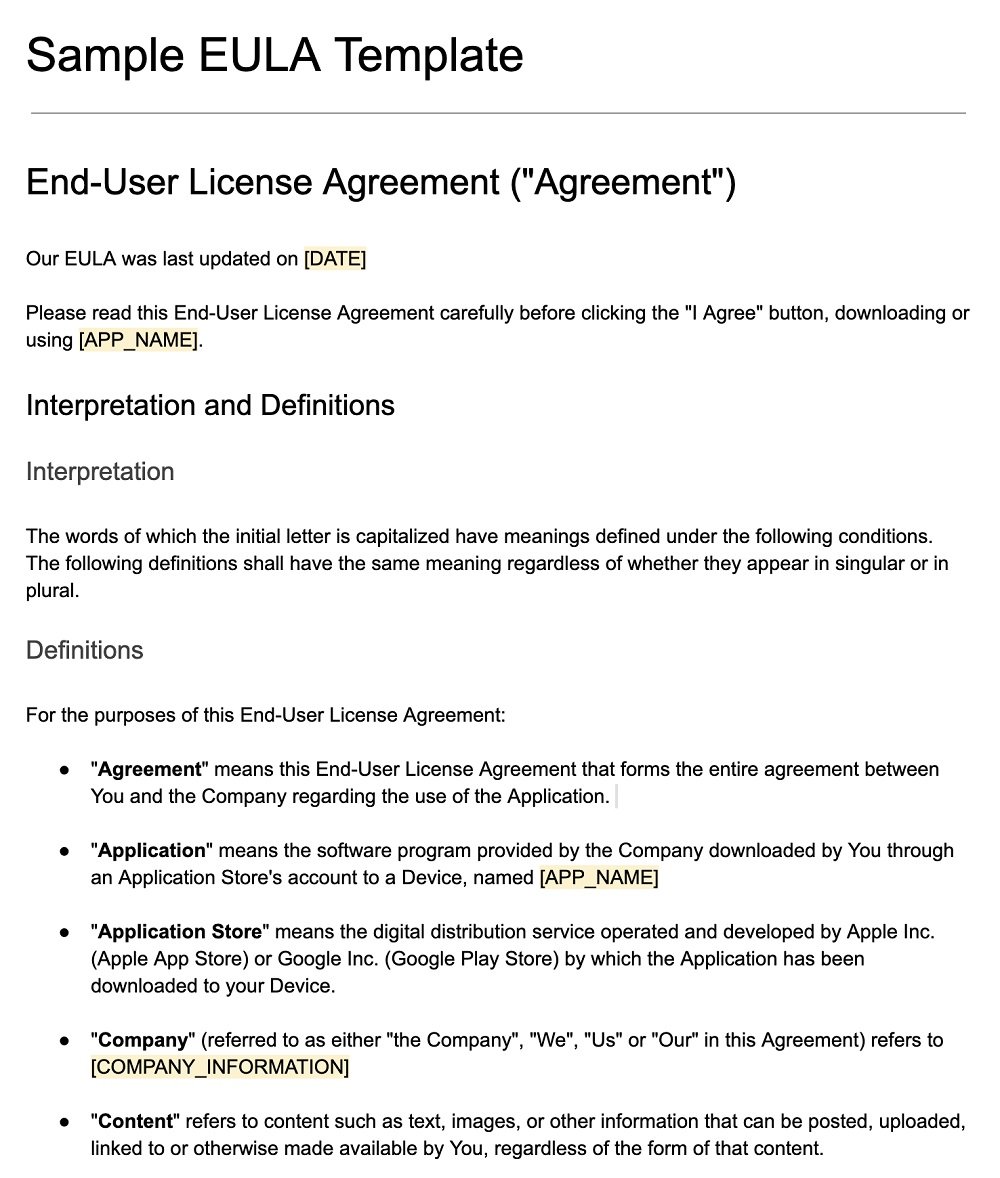
More Templates
More specific templates are available over our blog.
| Sample Mobile App EULA Template | EULA agreement for mobile apps. |
| Sample Terms and Conditions Template | A Terms and Conditions agreement for websites and online businesses. |
| Sample Mobile App Terms and Conditions Template | A Terms and Conditions agreement for mobile apps. |

Comprehensive compliance starts with a Privacy Policy.
Comply with the law with our agreements, policies, and consent banners. Everything is included.
